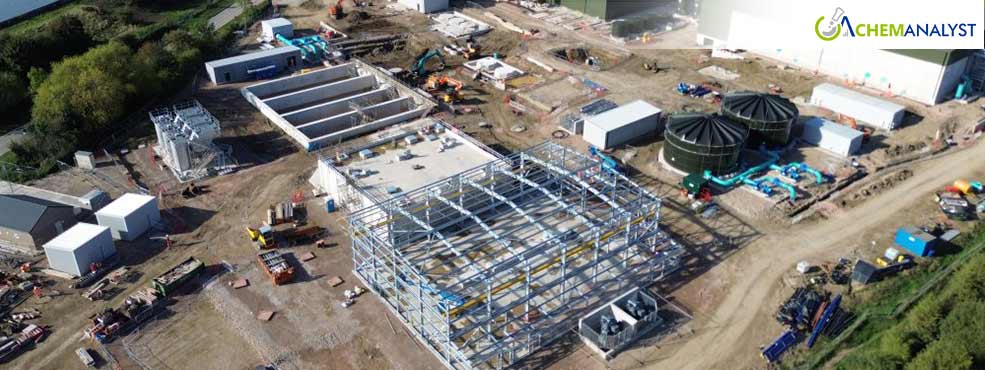Welcome To ChemAnalyst

MWH Treatment has successfully completed the detailed design for Severn Trent Water’s Witches Oak Water Treatment Works in Derbyshire, a state-of-the-art facility poised to enhance water security for over 224,000 households. With civil construction largely complete and mechanical and electrical installations well underway, the project is progressing on schedule to boost the region’s water supply.
The new plant is designed to provide an additional 65 million litres of water per day, improving the resilience of the Derwent Valley Aqueduct (DVA) network that serves the East Midlands. This development is part of Severn Trent’s ambitious £566 million Green Recovery Programme, where MWH Treatment is acting as the principal contractor and designer, leveraging its expertise across design, engineering, procurement, construction, and commissioning. The company’s prior experience with Severn Trent’s Church Wilne granular activated carbon plant has also been integrated into the project’s execution.
MWH Treatment’s Project Director, Richard Thomson, highlighted key milestones, including the installation of innovative ceramic membrane pressure vessels, alongside pipework, pumps, and essential ancillary equipment. The summer months were strategically utilized to install the majority of the process plant, optimizing dry weather conditions. The complex electrical control panels have also been factory-tested and installed, with high-voltage networks scheduled for energization by October—a significant milestone for the project.
The ceramic membrane technology employed is a game-changer for water treatment, providing highly effective removal of pathogens, suspended solids, and organic compounds, delivering high-quality water. Notably, these ceramic membranes are more resilient, with superior fouling resistance, easier cleaning, and a longer asset life of up to 25 years, reducing long-term maintenance requirements.
To enhance project efficiency, MWH Treatment has embraced digital delivery tools, such as 3D models, interactive visualizations, and 4D rehearsals. These tools allow for more precise construction sequencing, improving scheduling and reducing build time. The ability to visualize the entire project, including intricate details inside the 3D models, enables better coordination across multiple teams and optimizes site safety and communication. This modern approach is a significant departure from traditional 2D planning, providing a more interactive project management experience.
The project team has also achieved significant cost savings. A £7.4 million saving was identified by utilizing existing capacity at Derby Sewage Works for sludge management, rather than building new sludge dewatering facilities at Witches Oak. An additional £1.6 million saving came from evaluating a more cost-effective OSEC system for chlorination, which also improved long-term process resilience.
Given the challenges posed by treating water from the River Trent, Severn Trent conducted a series of pilot trials, which were crucial in fine-tuning the design and ensuring the plant would meet operational needs, particularly during seasonal fluctuations. A second pilot plant is now treating Derwent raw water, further validating the design and confirming the parameters for commissioning in 2024.
In response to these challenges, the project’s design now includes raw water balance tanks to store, blend, and regulate flow from both the Witches Oak lakes and the River Derwent, upstream of the in-line coagulation and adsorption (ILCA) process.
The next phases of the project involve complex commissioning processes, where MWH Treatment’s experienced engineers will work closely with Severn Trent Water’s operators to ensure smooth transition and compliance with Drinking Water Inspectorate standards. The high-voltage power supply, provided by National Grid, will also enhance the overall water supply resilience to customers across the region.
Water will be supplied by the new plant by May 2025, with the full project completion scheduled for December 2025, following process optimization and performance testing.
Beyond MWH Treatment, several RSK companies are contributing to the success of the project, including Stephenson Halliday for landscape appraisal, ADAS for soil surveys, and Hollywood Civil Engineering for the installation of high-voltage substation and buried pipework. Other key partners include Cognica, providing operational and maintenance manuals, and CR Civil Engineering, responsible for the ILCA coffer dam and excavation.
With the Witches Oak Water Treatment Works nearing completion, the project not only strengthens Severn Trent Water’s infrastructure but also showcases MWH Treatment’s commitment to delivering innovative, sustainable water solutions that meet the growing demand for reliable and high-quality water services.
We use cookies to deliver the best possible experience on our website. To learn more, visit our Privacy Policy. By continuing to use this site or by closing this box, you consent to our use of cookies. More info.
